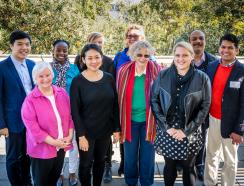Centre for Health Equity Training Research and Evaluation (CHETRE)

About CHETRE
The Centre for Health Equity Training, Research and Evaluation (CHETRE)’s mission is to ‘co-create intelligence for better health’ in and beyond South Western Sydney. CHETRE aims to provide leadership and expertise in training, research and evaluation for health equity.
CHETRE was established in 1998 to meet research and development needs in health equity within South Western Sydney. CHETRE was a founding member centre of the Centre for Primary Health Care and Equity when CPHCE was formed in 2005.
CHETRE was established as a joint unit between Population Health in South Western Sydney Local Health District and UNSW Australia. CHETRE is part of the management structure of both organisations and it aligns its work with both organisations’ policy priorities and strategies. CHETRE is based at the Ingham Institute for Applied Medical Research and benefits from its connections to industry and community. CHETRE’s Director is the Leader of Ingham’s Population and Health Services Research Stream.
Through collaboration with its partners within SWSLHD and Ingham, and beyond (e.g., local councils, other public sector agencies, and communities) CHETRE develops, supports and evaluates projects, programmes and policies to reduce inequities in health. CHETRE’s leadership and expertise are recognised locally and globally.
Our Streams
CHETRE’s work is structured in three streams:
- The Decision Support stream assesses the impacts of environmental, social, economic and policy change (proposals) on health and health equity and frames its findings in policy-relevant briefings and communications. Grounded in its international reputation in health impact assessment (HIA), the team supports local partners, other CPHCE research hubs, state, national and global health development through training and assessment. CHETRE Deputy Director Dr. Fiona Haigh manages the CPHCE HIA Unit.
- The Locational Disadvantage Stream engages with residents and groups in communities and neighbourhoods in our service area in South Western Sydney that suffer health and other disadvantages due to complex social and economic challenges. The stream focused on community development and partnership approaches that empower communities and consumers in order to promote resilience and more equitable health. The stream benefits from a long activist history and connections to the ACOSS-UNSW Poverty and Inequality Partnership.
- The Indigenous Health stream builds on nearly twenty years of close connections with the Tharawal Aborignal Corporation and the Aboriginal community in South Western Sydney. At the request of the community, and integrated in its Aboriginal-controlled governance structures, CHETRE has undertaken a unique longitudinal cohort study of the health of Aboriginal Babies since the early 2000s through the Gudaga program (‘Gudaga’ is Tharawal for ‘healthy baby’). Work within this stream also extends into social determinants of Indigenous health, health promotion and Health in All Policies for Indigenous equity. We currently partner with local and national colleagues to develop data sovereignty protocols that should govern the mantra ‘no research on us without us’.
Our Partnerships
Partnerships are central to all our research and service development activities. Our core partnerships include state government agencies, local governments, community organisations and NGOs, and service providers within and outside the South Western Sydney Local Health District.
CHETRE supports and manages a number of key partnerships with colleagues from the public and social housing sector, urban planning, primary health care, justice, education and social development. These partnerships range in scale from regional, to state wide, national and international.


